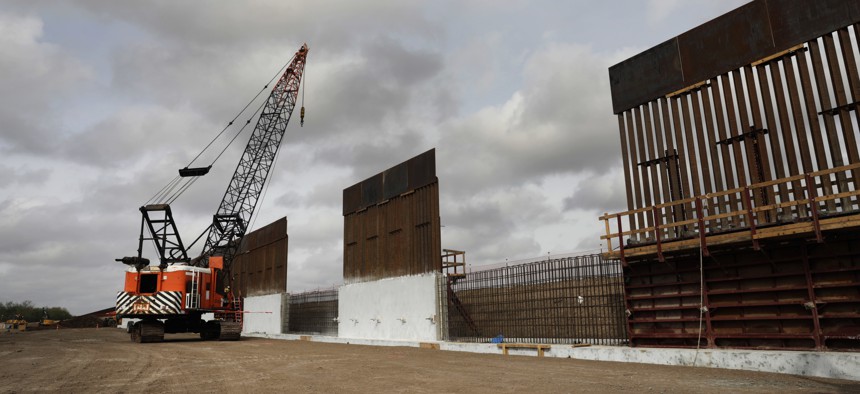
Construction crews work to erect levee wall system in a remote area south of Weslaco, Texas in the U.S. Border Patrol’s Rio Grande Valley Sector. Jan. 13, 2020. Glenn Fawcett/CBP
Trump Targets Major Weapons Projects To Fund Wall
The $4 billion in procurement reprogramming is part of a total of what is believed to be roughly $7 billion in military construction and counternarcotics funding that the White House is planning to divert.
President Trump wants to reprogram almost $4 billion in Defense Department funds to pay for his now-infamous wall on the southern border, according to a budget request sent to Congress obtained by Defense One.
The funds will be drawn mainly from procurement for major weapons programs, including for the fifth-generation F-35 fighter jet, as well as from shipbuilding. $1.3 billion will be drawn from the National Guard alone.
The $4 billion in procurement reprogramming is part of a total of what is believed to be roughly $7 billion in military construction and counternarcotics funding that the White House is planning to divert.
The move is almost certain to spark outrage on Capitol Hill, where congressional defense committees must approve the transfer. Democrats have hammered Trump for what they see as an end-run around Congress; while some Republicans have expressed discomfort with the notion of raiding defense funds to pay for the border wall.
The White House appears to be cutting from projects that Congress boosted by billions of dollars above what the Pentagon requested this year. If approved, the move would impact major projects run by some of American’s largest defense companies, including Lockheed Martin, Boeing and Huntington Ingalls Industries.
Projects slated for cuts include two Marine Corps F-35 Joint Strike Fighters (Lockheed Martin), two MV-22 Osprey (Bell and Boeing), two C-130J transports (Lockheed), eight Reaper attack drones (General Atomics) and one Navy P-8 Poseidon (Boeing) submarine hunting aircraft. Also cut are funds for a landing helicopter assault ship (Huntington Ingalls), an expeditionary fast transport ship and $180 million for an effort to buy new attack planes.
Some of the projects are at the heart of the Pentagon’s “great power competition” strategy, since planes like the F-35 and P-8 would be used in a war with peer rivals China and Russia.
The wall — and how it will be paid for — has remained one of the most politically divisive issues of Trump’s presidency. Trump has turned to reprogramming already-appropriated funds to cover the costs, claiming authority under an emergency order he declared last year after Congress repeatedly refused to fund the request. The fight resulted in an historic 35-day government shut down last year.
Democratic lawmakers have in the past threatened to yank Trump’s authority to reprogram funds over the tactic. Last year, Trump raided only military construction funding to pay for the project.
The move has raised hackles from some Hill Republicans — even those who support the construction of the wall, like Rep. Mac Thornberry, the top Republican on the House Armed Services Committee.
"The re-programming announced today is contrary to Congress’s constitutional authority, and I believe that it requires Congress to take action," Thornberry said in a statement. "I will be working with my colleagues to determine the appropriate steps to take."
"Congress has the constitutional responsibility to determine how defense dollars are spent. Once those choices have been made, the Department of Defense cannot change them in pursuit of their own priorities without the approval of Congress," he said. "Attempts to do so undermines the principle of civilian control of the military and is in violation of the separation of powers within the Constitution."






